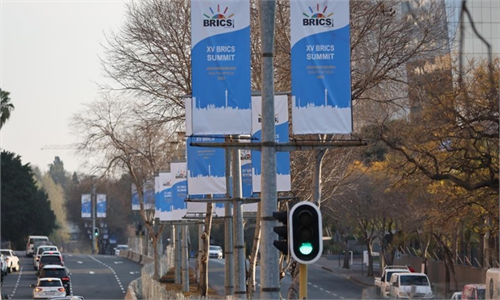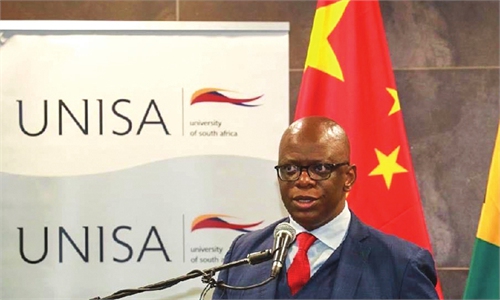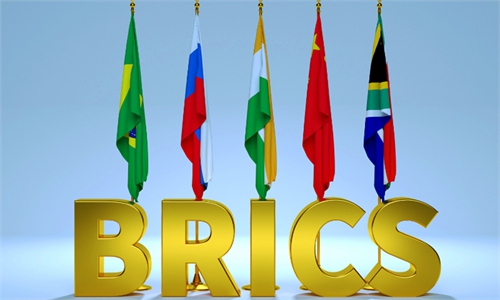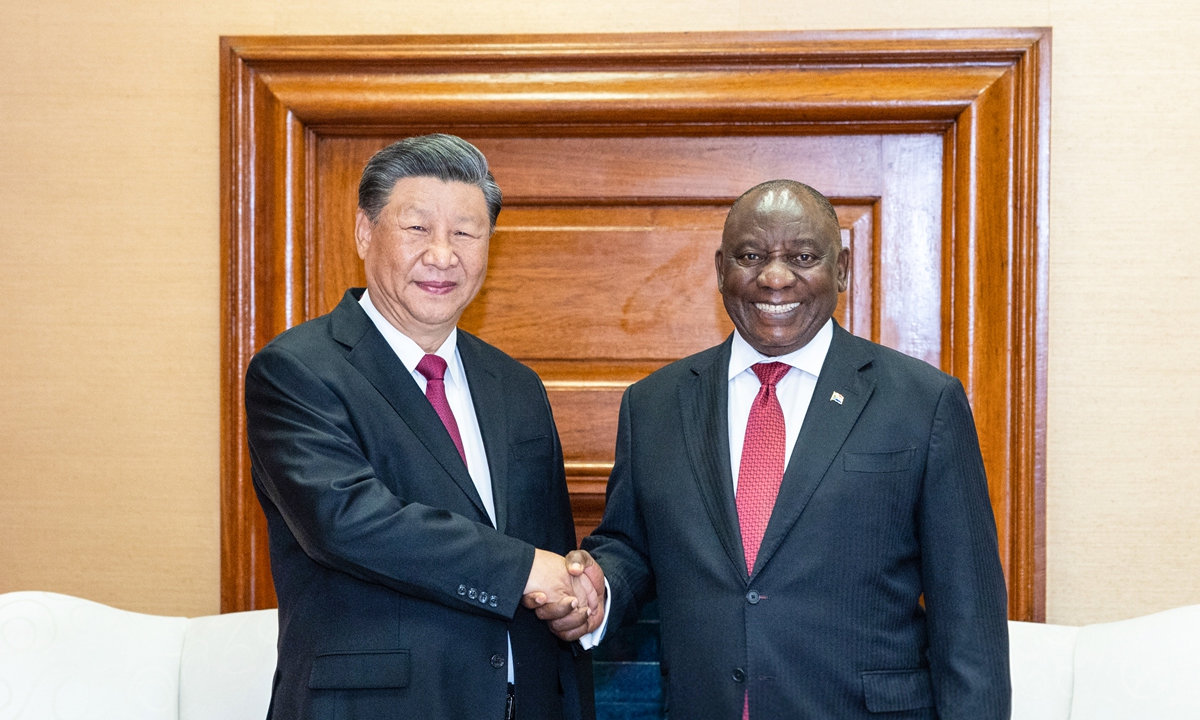
Chinese President Xi Jinping shakes hands with South African President Cyril Ramaphosa on August 22, 2023. Xi arrived in Johannesburg on Monday to attend the 15th BRICS Summit, and to pay a state visit to South Africa. Photo: Xinhua
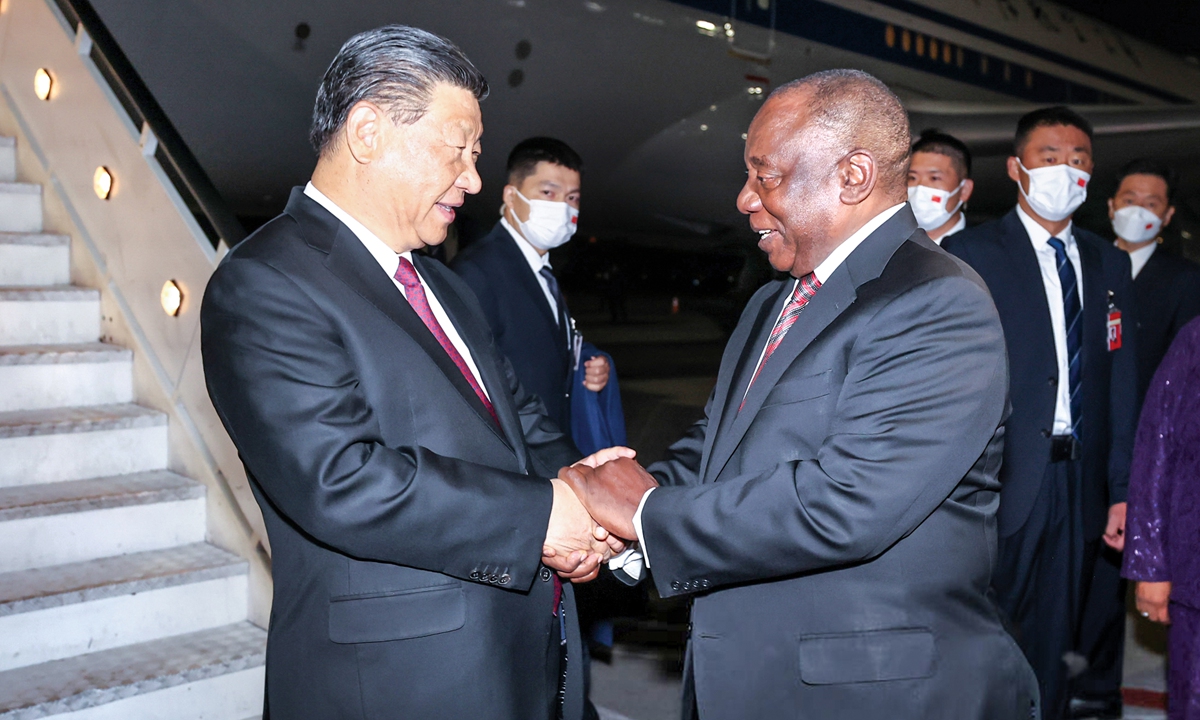
Chinese President Xi Jinping is warmly greeted by South African President Cyril Ramaphosa upon his arrival at the OR Tambo International Airport in Johannesburg, South Africa, on August 21, 2023. Xi arrived in Johannesburg on Monday to attend the 15th BRICS Summit, and to pay a state visit to South Africa. Photo: Xinhua
Chinese President Xi Jinping kicked off his state visit to South Africa and met with the South African President Cyril Ramaphosa on Tuesday ahead of the 15th BRICS Summit, as China-South Africa relations enter a golden era with cooperation across various fields expected to deepen. The Chinese leader also hailed the China-South Africa friendship which stands at a new historical starting point.Since the establishment of diplomatic ties 25 years ago, China and South Africa have achieved leapfrog development, which has gone far beyond the scope of bilateral relations and has more and global significance, some experts said. The two leaders jointly unveiled a blueprint for the future development of China-South Africa relations, embarking on a new journey of building a high-level China-South Africa community with a shared future.
During the meeting between Xi and Ramaphosa on Tuesday, Xi said this is his fourth visit to South Africa as Chinese President. "I have warm feeling when I visit the country again after five years. Under the leadership of President Ramaphosa, South Africa enjoys a growing national development and international influence. China is pleased about this and wishes South Africa even greater progress on its development path," Xi said.
The reason why China's relationship with South Africa is so good and the China-South Africa friendship is so deep is crucially because both countries and parties have shared weal and woe on their respective developmental paths, forging a profound friendship like comrades and brothers, Xi said.
Right now, standing at a new historical starting point, inheriting the China-South Africa friendship, deepening cooperation and strengthening collaboration are the mutual wish of both countries and also the significant responsibility of our times, Xi said, noting that he is willing to work alongside President Ramaphosa to push the China-South Africa partnership to new heights.
Xi said on Tuesday that China and South Africa will work to deepen bilateral cooperation in electric power, new energy as well as scientific and technological innovation. He also said that China is ready to import more quality products from South Africa and will continue to encourage Chinese enterprises to invest and do business in South Africa.
On Tuesday morning local time, the Union Buildings in Pretoria displayed the flags of China and South Africa. A considerable crowd of people have gathered, anticipating the arrival of Chinese President Xi. The atmosphere was full of anticipation and excitement.
Following the meeting between Chinese and South African leaders, Xi also received the Order of South Africa from President Ramaphosa on Tuesday. Speaking at the ceremony, Xi said the China-Africa comprehensive strategic partnership has entered a golden age, as political mutual trust between the two sides continues to deepen, and mutually beneficial and practical cooperation in various fields has yielded fruitful results.
Xi reiterated that no matter how the international situation changes, the two sides will remain committed to deepening bilateral friendly cooperation.
Xi arrived in Johannesburg on Monday evening to attend the 15th BRICS Summit and to pay a state visit to South Africa. South African President Ramaphosa and other South African officials extended a warm greeting to Xi at the airport.
In a written speech, Xi extended heartfelt greetings and best wishes to the people of South Africa on behalf of the Chinese people. Noting that this year marks the 25th anniversary of the establishment of diplomatic relations between China and South Africa, Xi emphasized that the comprehensive strategic partnership between the two countries has entered a new stage.
During a press briefing held on Tuesday, Wu Peng, Director-General of the Department of African Affairs at China's Ministry of Foreign Affairs, said that this visit fully demonstrates China's high regard for the development of relations with both developing countries and South Africa, as well as China-Africa relations. He emphasized that the visit injects new impetus into the comprehensive strategic partnership between China and South Africa.
Wu said that during the signing ceremony, President Xi and President Ramaphosa witnessed the signing of 11 cooperation documents, covering areas such as new energy power, direct investment, economic zones and industrial parks, blue economy, technological innovation, higher education and training, emergency power assistance, and the joint construction of Belt and Road infrastructure.
Wu said that both sides also issued a joint statement between the People's Republic of China and the Republic of South Africa.
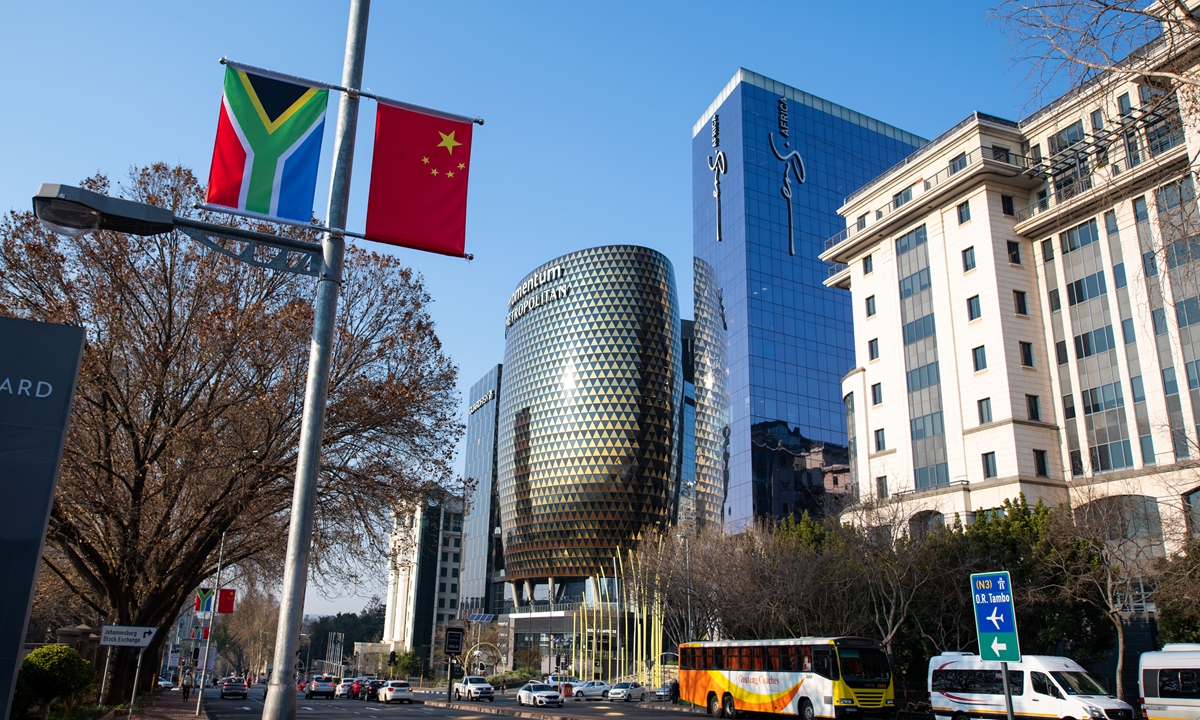
Chinese and South African national flags displayed alongside the road outside the Sandton Convention Centre in Johannesburg, South Africa on August 21, 2023. The capital city of the country is set to host the upcoming BRICS summit. Photo: Weng Qiyu/GT
'Comrades plus brothers'Busi Mabuza, Chairperson of the South Africa Chapter of the BRICS Business Council, told the Global Times in Johannesburg that South Africa and China share a profound friendship. In 2010, China staunchly supported South Africa's inclusion in the BRICS mechanism, providing South Africa with the opportunity to engage in close cooperation across various domains with several of the world's largest and rapidly growing economies, yielding substantial benefits.
She expressed that there is extensive space for cooperation between South Africa and China in economy and trade, noting that she was pleased to witness an increasing number of high-quality South African specialty agricultural products entering the Chinese market.
She also hopes for deeper collaboration between South Africa and China in infrastructure, aiding South Africa to enhance its transportation systems including roads, railways and aviation, to create better conditions for trade connectivity.
Mabuza hailed the China-proposed Global Development Initiative, which she said is in accordance with South Africa's development plan and is conducive to the equitable and sustainable development of the world.
South Africa and China have a thriving economic relationship. China is currently South Africa's largest global trading partner, and South Africa holds the distinction of being China's foremost trading partner in Africa. According to data released by China's Ministry of Commerce, bilateral trade between China and South Africa reached $56.74 billion in 2022, marking a 5 percent increase year-on-year and reaching an eight-year high. This growth trend has continued to accelerate in the first half of this year, with a further increase of 11.7 percent.
In Johannesburg, Chinese brands such as Huawei, Gree are ubiquitous. Chinese appliances, smartphones, and automobiles are all favored by the local population, the Global Times learned.
The two leaders also witnessed the signing of a slew of cooperation agreements ranging from industrial cooperation to energy to agriculture on Tuesday, among which energy cooperation is seen as critical for tackling the domestic energy woes in South Africa.
Historical reasons have led to a long-term lack of investment in the power sector in South Africa, coupled with the seriously aging of existing thermal power units, resulting in electricity shortages. To help address this issue, Chinese companies will sign agreements with South Africa during the BRICS Summit to promote energy security and electricity development, the Global Times learned.
"The China-South Africa partnership is like comrades plus brothers, and the state visit paid by our top leader will help elevate bilateral relations to a new high," He Wenping, director of the African Studies Section at the Institute of West Asian and African Studies under the Chinese Academy of Social Sciences, told the Global Times on Tuesday.
Besides helping South Africa tackle one of its most pressing issues like the shortage of electricity, China will play an important role in the country's industrial development, helping create more jobs and increase people-to-people and cultural exchanges, He Wenping said. "Xi's visit to South Africa will deepen the special 'comrades plus brothers' friendship of the two countries."
The development of China-South Africa relations is a microcosm of the China-Africa friendship, and China-Africa relations can best reflect the imprint of China's major-country diplomacy, some experts said.
Milestone gathering
South Africa is about to enter "BRICS time" soon. The news center for the BRICS Summit is now operational, with nearly 100 journalists working there on Tuesday. The Global Times learned during the pre-registration process that the daily registration count is around 500 participants, encompassing individuals from various industries including media and businesses.
Traces of the BRICS Summit are evident on the streets of Johannesburg. South African authorities have allocated increased police resources to ensure the security of the event. Local media broadcasts are predominantly centered around BRICS-related news.
Leaders from the BRICS nations - Brazil, Russia, India, China and South Africa - are expected to gather on Tuesday with the BRICS expansion, the Ukraine crisis and reducing the dependence on the US dollar topping the agenda, according to media reports.
During the BRICS Summit, Xi and Indian Prime Minister Narendra Modi "will have chances to have close exchanges," Wu said at the press conference on Tuesday.
However, some Western media hyped that the gathering of BRICS leaders is about "countering the US," to draw many countries in the Global South closer to China and is a test of Beijing's ambitions to remake the grouping.
Both Chinese and South African experts believe that the BRICS grouping has now become a counterbalancing force against global governance led by developed nations. Representing major developing countries, they hold significant weight in terms of economic strength, voice and the pursuit of fairness and justice. Their voice represents the concerns of developing countries, and this voice can drive changes in global governance, experts said.
The motives for a dozen countries that reportedly want to join BRICS include interest in the organization's economic development potential and their desire to build a more equitable global order, David Monyae, director of the Center for Africa-China Studies at the University of Johannesburg, told the Global Times in a recent interview.
"What is key is that these emerging powers are unhappy with the current global order. For these emerging powers, when they look at the current global order led by the US and Western countries, the system hasn't evolved since 1945," Monyae said. It has not been changed to reflect the current realities in terms of the size of the economy, population, and other issues, he noted.
There is also unhappiness with the weaponization of the US dollar and the weaponization of some global public goods, such as SWIFT, in the aftermath of the Russia-Ukraine conflict, he said.

